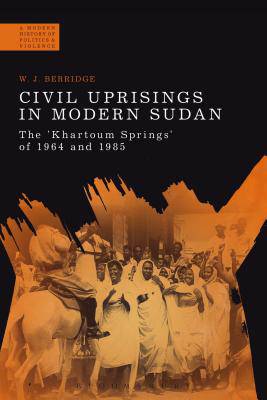
- Retrait gratuit dans votre magasin Club
- 7.000.000 titres dans notre catalogue
- Payer en toute sécurité
- Toujours un magasin près de chez vous
- Retrait gratuit dans votre magasin Club
- 7.000.0000 titres dans notre catalogue
- Payer en toute sécurité
- Toujours un magasin près de chez vous
296,95 €
+ 593 points
Format
Description
This book is open access and available on www.bloomsburycollections.com. It is funded by Knowledge Unlatched.
In the wake of the protests that toppled regimes across the Middle East in 2011, Sudanese activists and writers have proudly cited their very own 'Arab Springs' of 1964 and 1985, which overthrew the country's first two military regimes, as evidence of their role as political pioneers in the region. Whilst some of these claims may be exaggerated, Sudan was indeed unique in the region at the time in that it witnessed not one but two popular uprisings which successfully uprooted military authoritarianisms. Civil Uprisings in Modern Sudan provides the first scholarly book-length history of the 1964 and 1985 uprisings. It explores the uprisings themselves, their legacy and the contemporary relevance they hold in the context of the current political climate of the Middle East. The book also contends that the sort of politics espoused by various kinds of Islamist during the uprisings can be interpreted as a form of early 'post-Islamism', in which Islamist political agendas were seen to be compatible with liberalism and democracy. Using interviews, Arabic language sources and a wealth of archival material, this book is an important and original study that is of great significance for scholars of African and Middle Eastern political history.Spécifications
Parties prenantes
- Auteur(s) :
- Editeur:
Contenu
- Nombre de pages :
- 304
- Langue:
- Anglais
- Collection :
Caractéristiques
- EAN:
- 9781472574015
- Date de parution :
- 26-03-15
- Format:
- Livre relié
- Format numérique:
- Genaaid
- Dimensions :
- 157 mm x 234 mm
- Poids :
- 589 g

Les avis
Nous publions uniquement les avis qui respectent les conditions requises. Consultez nos conditions pour les avis.






